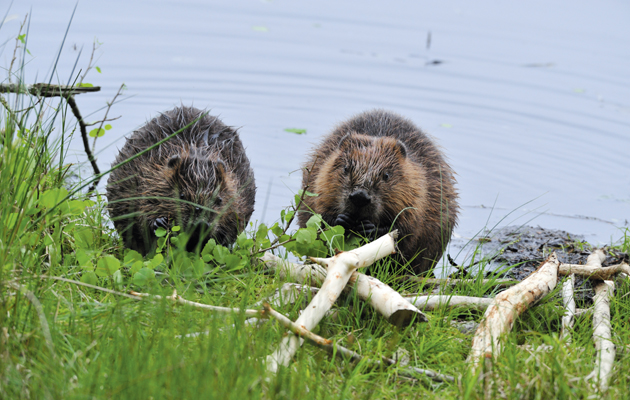Is reintroducing beavers in to the wild a sensible decision? And for beavers that have been released illegally, should they be allowed to remain? Mark Lloyd, chief executive of the Angling Trust, thinks we may live to regret the decision.
Beaver reintroduction, like many schemes to reintroduce species, is a complicated subject. Species reintroduction has a significant element of ‘letting the genie out of the bottle’. Once decisions have been taken the rammifications on the eco-system can be profound. And unexpected. Does beaver reintroduction pose a threat to our fishing? And if so will the top 10 trout rivers be under threat from this beaver reintroduction? Mark Lloyd explains.
BEAVER REINTRODUCTION
The Angling Trust is dismayed by Natural England’s recent decision to allow illegally released beavers to remain in the River Otter in Devon for another five years [once it has been confirmed that they are free of disease and of Eurasian origin]. We have been campaigning to have the beavers removed. Beaver reintroduction poses a great risk: to fisheries, of flood and to landscape. The risks of beaver reintroduction are too great to allow them to spread across the region and thence into the rest of the country.
Last year, we were successful in getting a commitment by the then Secretary of State for the Environment to capture the animals. We were representing our members who, rightly, were concerned that the dams beavers build on rivers could cause flooding and block the migration of fish up and down rivers. Natural England’s decision seems to overturn that commitment.
Devon Wildlife Trust, which has campaigned for the beavers to remain, claims the animals will be tagged and that this is a scientific experiment. Tagged or not, these animals will have untagged offspring and there seems little doubt that they will now colonise other rivers in the region. Even if they could be found at the end of the “experiment”, no politician is going to sanction culling or returning to captivity these critters and their progeny in five years’ time. This is a decision by a wildlife charity, run by unelected officials, that means we have no choice but to accept that beavers are here to stay. Beaver reintroduction by the back door.
Not all environmental charities are as enthusiastic. Arlin Rickard, chief executive of the Rivers Trust, said, “As we consider the reintroduction of the European beaver in Britain and the contribution the species might make to riverine ecosystems in the absence of key predators, it is essential to also agree in advance management and control measures. If society is not sufficiently responsible to accept that farmers and riparian owners may need to intervene should numbers spiral, then we are not yet sufficiently responsible to undertake beaver reintroduction in the first place.”
Landowners have much to be concerned about following this decision. Will they be liable for flooding caused by beaver dams? Will they be allowed to interfere with dams or face sanctions for doing so under the Wildlife and Countryside Act? Will they be allowed to shoot beavers if they are damaging trees of local conservation or landscape importance?
In our view, government agencies should not be carrying out hare-brained experiments such as introducing new species to rivers until they have tackled the massive problems with low flows, flooding, pollution, habitat loss and barriers to fish migration that are endemic in the nation’s waterways.
NO PLACE IN MODERN RIVERS FOR BEAVER REINTRODUCTION
Of course, more than 500 years ago beavers were native to some parts of the British Isles. However, our rivers have changed dramatically in the past five centuries. They now suffer from endemic pollution, over-abstraction of water and the presence of more than 20,000 weirs and dams, which act as barriers to fish migration. Nearly all fish species, not just trout, salmon and eels, need to migrate up and down rivers in order to complete their life cycle. Beaver reintroduction and the addition of beaver dams will only increase the number of obstacles that fish have to overcome. If we remove all these barriers to migration, then beavers might present less of a problem to fisheries but this will cost hundreds of millions of pounds and, at current rates of progress, decades to achieve.
In a healthy, natural ecosystem, beaver reintroduction can be beneficial because they introduce woody debris to rivers and their dams can trap silt and create new habitats. In such wild systems, this benefit is greater than the negative impact on fish migration. However, fewer than 25% of the rivers in England and Wales are in good ecological condition and the Angling Trust’s view is that it would be irresponsible to consider reintroducing this species without first restoring our rivers to good health.
Evidence from North America and Germany shows the considerable risk to infrastructure – including flood-defence assets, roads and railways – from allowing beavers to become established in high-risk and populated areas. An adult beaver can bring down a 10in wide tree in under an hour and a single beaver family will fell up to 300 trees a year. In the upper Danube region of Germany, beavers have caused £5 million of damage. How will riverside residents feel when the only tree in their garden is gnawed down overnight? Or a beaver dam floods a housing estate that has never flooded before? The problem with beavers is that they are secretive, mainly nocturnal and don’t stay put, so they will spread from rural areas to villages and the edges of towns and cities.
The beavers in Devon were almost certainly released illegally. Natural England’s decision to let them stay appears to run contrary to the commitment from the elected Secretary of State for the Environment last year to return all these animals to captivity. What’s more, it sets a dangerous precedent for any enthusiasts of “re-wilding”; all they have to do is release some imported animals into the countryside and, as long as enough people say “aah, aren’t they cute”, our government agencies will give them leave to remain. I predict that this beaver reintroduction will be a decision we will all regret in years to come.





